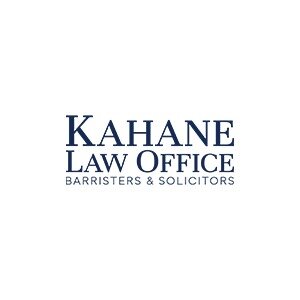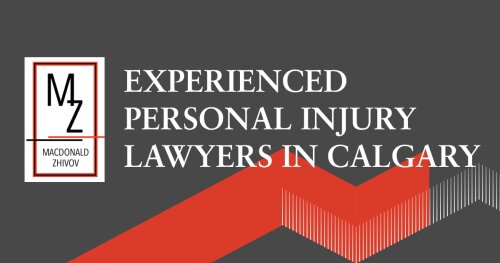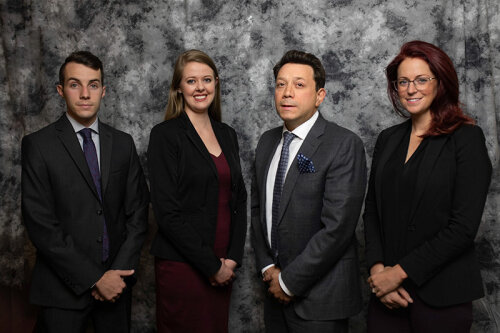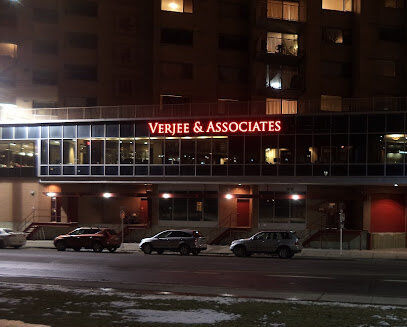Best Car Accident Lawyers in Calgary
Share your needs with us, get contacted by law firms.
Free. Takes 2 min.
List of the best lawyers in Calgary, Canada
About Car Accident Law in Calgary, Canada
In Calgary, car accident law falls under the jurisdiction of personal injury law. It dictates that if you've been injured in a vehicle accident due to the negligence or recklessness of another individual or entity, you are entitled to compensation. This can cover medical costs, loss of income, physical and psychological pain and suffering, and other out-of-pocket expenses. However, note that Alberta operates under a no-fault insurance system, offering Accident Benefits to accident victims regardless of who caused the mishap.
Why You May Need a Lawyer
Legal expertise can be invaluable in navigating car accident claims in Calgary. Undertaking the complexities of insurance policies, determining liability, accurately assessing claim value, and negotiating settlements all require specialized knowledge and experience. A lawyer can also corroborate your claim with relevant supporting evidence, liaise with insurance companies on your behalf, and represent you in court if necessary. Especially if injuries are severe, fatalities occurred, or there are disputed liability issues, legal representation is advisable.
Local Laws Overview
In Calgary, drivers must carry a minimum of $200,000 in Third-Party Liability Insurance. The province also employs a no-fault insurance system, which grants Accident Benefits regardless of fault. Victims can pursue additional compensation if another party's negligence caused the accident but are subject to a limited Minor Injury Cap on pain and suffering damages. Laws also stipulate a 2-year limitation period from the date of accident/injury discovery to filing a lawsuit. Non-compliance with road safety regulations, distracted or impaired driving, could potentially increase the culpable party's liability.
Frequently Asked Questions
1. What is the first thing I should do after a car accident?
Ensure safety first, assist injured individuals, and call for medical help/police as required. Document the accident scene, and record details of other parties involved.
2. When should I report the accident to the insurance company?
Prompt reporting, within the first 7 days, aids in rapid claim processing. It also helps in case time-sensitive Accident Benefits apply.
3. Can I sue if the accident was partly my fault?
Yes, you can. Alberta laws allow shared fault claims, but compensation might be reduced according to your percentage of responsibility.
4. How long will a claim take to settle?
Claim settlement times can vary based on case complexity. A lawyer can help expedite the process.
5. Will my insurance rate increase after an accident?
If you're not at fault, your rates shouldn't increase. However, fault or multiple claims may lead to rate hikes.
Additional Resources
The Calgary Legal Guidance, Pro Bono Law Alberta, and the University of Calgary Public Interest Law Clinic offer free or low-cost legal advice. Alberta Insurance Council, Alberta Transportation, and Service Alberta provide vital information and guidance. Alberta Health Services can direct to relevant health resources post-accident.
Next Steps
If you've been in a car accident, considering legal help, start by gathering all related documentation. Next, research attorneys skilled in car accident law in Calgary, ensuring they have a strong track record. Schedule consultations to discuss your case, understand process timelines, your rights, potential outcomes, and legal fees. Once you're comfortable, select your lawyer and begin the process of filing your claim.
Lawzana helps you find the best lawyers and law firms in Calgary through a curated and pre-screened list of qualified legal professionals. Our platform offers rankings and detailed profiles of attorneys and law firms, allowing you to compare based on practice areas, including Car Accident, experience, and client feedback.
Each profile includes a description of the firm's areas of practice, client reviews, team members and partners, year of establishment, spoken languages, office locations, contact information, social media presence, and any published articles or resources. Most firms on our platform speak English and are experienced in both local and international legal matters.
Get a quote from top-rated law firms in Calgary, Canada — quickly, securely, and without unnecessary hassle.
Disclaimer:
The information provided on this page is for general informational purposes only and does not constitute legal advice. While we strive to ensure the accuracy and relevance of the content, legal information may change over time, and interpretations of the law can vary. You should always consult with a qualified legal professional for advice specific to your situation.
We disclaim all liability for actions taken or not taken based on the content of this page. If you believe any information is incorrect or outdated, please contact us, and we will review and update it where appropriate.

















